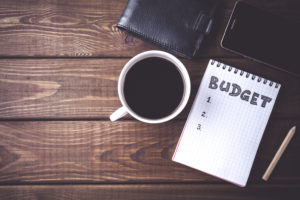

How to Avoid Credit Card Debt: 9 Simple Tips
It seems like everyone wants to help you get out of debt.
For example, if you Google “How to get out of credit card debt”, you’ll see close to 400 million search results, and a lot of it is selling something. Many financial products appear trying to get you to consolidate or do a balance transfer.
But if you Google “how to avoid credit card debt”, the search results are about 20% of that number.
So many companies are willing to help you solve the problem when you’re already in it, but who’s around to help you figure out how to avoid it?
Not only that, but how can you make it happen when you’re a busy family trying to balance work, school and the after-school activity shuffle?
The truth is, It’s hard to stay out of debt even for the most organized, financially-savvy families because sometimes life happens or we take our eye off the ball because more things are pressing at the moment.
But there are things you can do to stay out of debt even if you’re super busy.
Table of Contents
How we get into credit card debt
Part of understanding how to avoid debt is understanding first how people get into it.
The good news is that there is a solution to buffer yourself against these reasons actually putting you into credit card debt – More on that in a bit.
We often think financial reasons are the main culprit, and that may certainly be the case.
But there is also a mindset that gets us there too. Sometimes those are an even bigger driving factor of why we get into credit card debt.
Let’s start with the ones that don’t come to mind first.
Reason #1: Not knowing we’ve overspent
Credit cards make it much harder to know where we stand during the month.
Most of us see money in the bank account and feel like we’re ok…
Then all of a sudden, the credit card bill comes.
“How did we spend this much! We don’t have enough to cover the whole bill.”
This happens again and again and becomes a perpetual cycle that many stay on.
The reality is that credit cards add a layer of complexity to determining our true financial position.
Think about how different it would be if your credit card deducted the money from your bank account every time you spent. Then you’d be able to see the bank account go down and know when you’ve overspent.
Oh wait, that’s called a debit card 🙂
In all seriousness though, credit cards are fine if you’re used to tracking your spending or have a better understanding of the psychological tricks they use to get you to spend.
Reason #2: Being ok with it
The human brain is pretty amazing. It learns to cope and get “comfortable” or “numb” with any circumstance after we’ve been in it for a while.
Once we start carrying a credit card balance, we start to view it as ok, as if it’s no big deal.
This mindset is one that gets people in and keeps them in credit card debt.
Reason #3: Bank account balance you’re used to.
This is kind of an interesting one.
What comes to mind first is that there’s not enough to cover the bill so you just make the minimum payment.
But sometimes, families have the money, but they just don’t want to see it leave their bank account.
Credit cards rack up a balance alongside cash in the bank. It gives people a sense of security even though it’s not the true reality.
Whether the first or second scenario describes you, the idea here is that we all have a number we’re “used to” seeing in our checking account or savings account.
When we have more money, we feel like we can spend. When we have less, we will do what it takes to get it back up…including carrying a balance even if we’re paying high interest.
Reason #4: Unexpected Expenses
You know the feeling.
Things are moving along. You’re on a solid financial path.
Then all of a sudden, something happens. Car trouble, house trouble, a medical bill. It’s something in the thousands that you end up putting on a credit card.
We’ve all heard about this, so I won’t spend too much time here.
Reason #5: Temporary Set Back or Drop in Income
You’re used to living a certain way and living off of what you make, but then your income drops.
Maybe there’s a job loss, a decrease in salary, or you get paid only when you work and you just can’t work for a period of time.
Either way, that drop in income tips the scales from saver to spending more than you make and making your credit card balance grow.
Why is credit card debt bad?
Yes, we know that credit cards usually carry the highest interest rates, but there are other reasons at play here too.
Reason #1: It’s the gateway debt to all others
Once a family goes into credit card debt once, it becomes “normal”. Carrying a balance ends up being no big deal.
After a while, everything starts to go on monthly payments.
Then a ton of monthly cash flow is going to payments which makes it tough to get ahead since you’re still playing catch up.
*By the way, there’s bad advice out there saying that carrying a little bit on credit cards is good for your credit score. That is not true! It actually lowers your credit score because you have less available credit.
Reason #2: The stress of playing catch up
Debt is money you have spent but haven’t paid for yet.
So you not only have to pay for your ongoing expenses, but you also have to keep paying on past expenses.
It’s kind of like pulling an all nighter then having to put in a full day the next day…over and over again.
This can be a big stressor for couples because they carry guilt around it and feel like they can never get ahead.
It’s very common to sit in this reality for a little bit. Usually couples reach out to me when they get shaken out of the numbness and really want to start taking action.
Reason #3: Monthly payments eat up your cash flow
It’s hard to save money when you have a bunch of payments to make by playing catch up.
Until those debts are paid off, the cycle continues because of having to pay minimum payment after minimum payment.
Reason #4: It makes what you buy more expensive
We’re always looking for bargains, for sales, and for deals. We’re on the hunt to “save” money.
Balances on credit cards are the opposite. It makes everything you have bought 20-25% more expensive each year you carry the balance.
Even if you secure lower interest rates eventually, each additional purchase carries a high interest rate. You pay more for every additional purchase.
Reason #5: It just straight up doesn’t feel good
Even if you don’t recognize it, credit card debt is zapping your energy.
How do I know this?
Picture yourself looking at your credit card statement with a balance on it. How does that feel?
Now, close your eyes and imagine if you were credit card debt free…
Did you feel that relief?
It’s a weight on your shoulders.
If we want to live our best life, we need to remove any stressors we can so we can be at peak performance. Credit card debt is one of those we need to get rid of.
How to stay out of credit card debt: The conventional advice
Everyone seems to have ideas on avoiding credit card debt.
Do I agree with them? Sure, but that doesn’t mean it’s helpful.
Here’s my take on it, then I’ll follow it up with things that might actually work.
- Keep a budget – “Yeah, tried that. It didn’t work.”
- Pay off the full balance – “We would if we could.”
- Don’t buy it if you can’t afford it. – “Thanks Captain Obvious.”
- Delete your credit card info from being auto-filled. – “Look, we’re a busy family. You want me to take more time to make the quick purchases we need?”
- Close all of your credit cards – “We’re not quite comfortable taking that step. Plus, we need to get a cushion in place first.”
Sorry if this sounds a little snarky, but this is real life here. We want things that will work without having to invest a lot of time.
Avoid credit card debt with these 9 simple tips
This a comprehensive and unconventional list that is meant to actually help you avoid debt.
Pick just ONE that resonates with you and you are willing to give it a try.
Rethink credit card rewards – Don’t spend dollars to get back pennies!
Points and cash back sound appealing…unless we flip it around.
1,000 points is worth anywhere between $10 – $20. Sounds good right?
What if it was reversed and the credit card company said, “Buy 50 and we’ll give you the 51st free!”
Or how about this: “For every $1 you spend with us, we’ll give you one or two pennies back!!”
That’s what the points are worth, spend dollars to get pennies.
It’s the same thing with cash back cards.
Even if you use store credit cards like Amazon or Target that give you 5% back.
If you spend $5,000 over the year, you get $250 back!! Woohoo!!!
Oh, but you’re out of pocket $4,750.
Don’t get me wrong, take these benefits if you shop at these stores, but don’t spend an extra $1 to save a nickel.
Compare the credit card interest rate to the rewards benefit
You might think that credit cards are offering these insane deals…but what if you compared the interest rate to the deal?
Divide the interest rate by the benefit.
If a credit card gives you 2% cash back but the interest rate is 20% on your balance, then the interest is 10x the reward.
Think about it this way. If you spend $1,000, you get $20 back in cash or points.
If you spend $1,000, pay off $900, but keep a $100 balance for the year, the interest on just that small amount negates the reward.
If you spend $1,000, and carry a $500 balance, you get back $20, but spend $100 in interest, an $80 difference.
If you love getting rewards, then you should absolutely despise carrying credit card debt.
Think like it’s a debit card
When you spend on a debit card, it automatically comes out of your bank account.
But if you spend on a card, the credit card issuer is fronting the money until the bill comes due at the end of they billing cycle. If you don’t pay it, it becomes a loan.
When you look at how much is in your checking, don’t take it on face value, net it out against what you owe on your credit cards.
That’s the “real” amount you have free & clear to work with today.
5 Minute Weekly Spending Review
Most people wait until the end of the month to see how much they spent and to work on their budgets for that matter.
At that point, it’s a whole project and it might even be too late.
But with a simple weekly spending review, you have 4 opportunities to adjust and end the month on target.
*This is the most important habit in personal finance!
Once a week, go in and review your transactions for the week. Then take a look at how much you’ve spent month-to-date.
Does the number look high? You can pull back a little next week and still end on target.
Have you done a good job spending less? Add in an extra date night or fun activity! You have the room.
It’s actually pretty easy to set up those spending targets so you can actually know how you’re doing. Plus, you won’t be surprised by the credit card bill.
Know what levers you can pull
This is all about planning for contingencies.
Something WILL happen at some point that will cause you to overspend.
When that happens, what can you do to make sure you pay off your credit card debt without going into more of it?
Here are some possible options:
- Pull money from an emergency fund or other savings.
- Take out cash sitting in a brokerage account.
- Temporarily reduce automated savings or investing.
- Temporarily reduce contributions to your retirement plan contributions or IRA
- Stop paying extra on your mortgage, student loans or other low interest debt.
- Can you make a little more money this month to cover the extra expenses?
The main idea here is to come up with strategies or a back up plan that you can implement quickly and doesn’t include cash advances or taking out other debt.
That way, you can just spring right into action rather than it being easier to just have credit card debt.
If you do have to do a balance transfer or refinance some debt to lower your payments or interest rate, you can try that too.
Just know that it doesn’t solve the long term problem. It just shifts it from one pocket to another.
Add up the monthly payments you already have
Sometimes we think, “What’s an extra payment? It’s no big deal!”
But those who take the time to add up how much they’re already paying toward these payments quickly understand that their capacity to take on more is not as big as they originally thought.
Take a few minutes to add it all up on your calculator app or on a sheet of paper.
Include those 0% payment plans at the home improvement store, furniture store, or those Buy Now, Pay Later.
If you want to take it a step further. Plot how long it will take you to pay these off and create a plan to pay off the debt faster.
Pull your normal credit card balance out in cash…just once.
How much do you spend on your credit card each month?
Next time you go to the bank, pull out that amount in cash. I did this one time, and my eyes almost popped out of my head.
There’s something about seeing all that money in cash that makes you think about it differently and change your perspective on spending.
If you don’t have the money to do that or to keep it out for very long, Just do what you can and deposit it back in the next day or two.
Or even use money from a board game you have at home, preferable Monopoly but don’t use the $500s.
Although the bank experience will be more powerful, anything will do.
Know that credit cards get you to spend more than you anticipated
Write down a few examples of when you spent more than you were expecting when you were using a credit card.
What happened there? Was it the points? A promotional offer? Not realizing how much you’ve spent?
Take some time to get a better understanding of your habits and triggers that lead to it.
If you want to go to the next step, come up with a couple of ideas on how to avoid it in the future.
Raise your financial standards
Remember how we talked about getting used to our situation earlier on?
Well you can raise your financial standards and expectations. Often this starts with how much you typically have in your bank account.
Take it slow.
If you’re used to running it down to $0 before you get paid, see if you can get to $500. If you’re used to $2,000, see if you can get to $5,000.
Same thing with your credit card debt. Are you used to carrying $5,000? See if you can get used to $2,000, then $0.
It’s a journey and the most important thing is getting to the destination. It’s better for it to take longer and get done than it is to sprint out of the gate but lose steam before crossing the finish line.
Need help staying out of credit card debt?
If you’ve been in and out of credit card debt and need help getting out or staying out, I’m here to help.
Think about which one of these resonates most with you and let’s have a conversation about it.
By the end, you’ll have some tangible takeaways. If you feel like you need more than one discussion, we can talk about that too.




